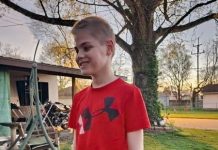The executive lead for Columbus’ new initiative to find solutions to the opiate epidemic in Bartholomew County, who has been on the job for about a month, already is finding ways to approach the problem.
Retired Cummins mechanical engineer Jeff Jones sat down with The Republic recently to talk about the organizational strategy for the ASAP initiative, which stands for Alliance for Substance Abuse Progress in Bartholomew County, the team working on the program and where the initiative will focus in its first months.
Jones spent 37 years working for Cummins, spending time in technical support and field service working with customers to solve product problems. That included four years in the Chicago area where he covered territories throughout the Midwest, leading team efforts to solve customer problems. He eventually moved from the more technical service side to more of a sales and marketing role. That new role included leadership assignments, and Jones describes himself as one of the few people at Cummins who spent an entire career in roles working with customers out in the marketplace, helping them successfully operate Cummins’ products. A big part of that challenge was to solve those problems better than any of Cummins’ competitors could, he said.
“I enjoyed that work. I think it played to my strengths,” Jones said.
[sc:text-divider text-divider-title=”Story continues below gallery” ]
Now, after a couple years enjoying retirement, Jones as a volunteer leads a three-pronged organizational structure with action teams focused on prevention, intervention and treatment and recovery from opiate addictions. The entire effort is being overseen by three local community leaders representing different parts of the community, Columbus Mayor Jim Lienhoop, Bartholomew County Commissioner Carl Lienhoop and Jim Bickel, who leads Columbus Regional Health, the community’s hospital system.
Jones said he expects to spend the next two years working on the community’s substance abuse problem with the help of the Columbus community.
Here are excepts from the interview with Jones.
Q: Your experience as a Cummins engineer seems tailor-made for what you are being asked to do now.
A: When it comes to thinking about could I lead a team to solve a complex problem, I felt like I had the right experiences to have a good chance at success. Now having said that, at the same time, I recognized, I had very little knowledge about the problem. I have no experience working in the area of substance abuse, or law enforcement or health care. So for me, it was my own sort of self-assessment, do I have a reasonable skill set that would enable me to lead? I’ve always felt that to be a really capable leader, it requires some skills and some knowledge. And I had to ask myself, do I think my skill set is a good match for the role they are asking me to play? I’m confident on one hand, and I think I need to be. I gotta tell you, it’s pretty humbling when I recognize the complexity of the problem and the experiences of not just the people that have been trying to deal with the problem, but even more humbling is the struggle for the individuals who are suffering, and the impact on their families.
Q: Did seeing 650 people at the kickoff event “Moving the Needle: Community Forum” add to your confidence?
A: If the first three steps in the process of addressing the issue is, No. 1: Acknowledge we have a problem; No. 2: Build awareness we have a problem; and No. 3: Gain support for addressing the problem, I’d say we’re off and running.
Q: Dr. Kendall Stewart, speaker at the April 19 kickoff, elicited some gasps from the audience when he said it was time to embrace reality because there are no simple solutions.
A: Over the last week or two, there’s been a couple of stories in The Republic where the headline has been “No quick fix.” And I agree with that — there is no quick fix. The closer you are to the problem, the more you understand it and the more you can relate to the statement ‘No quick fix.’ However, that doesn’t mean that there aren’t many solutions that will improve the situation. It is not hopeless. And I really don’t think it’s overwhelming. It is complex but our team is not overwhelmed by it. That’s because when you start to approach it analytically, and understand what this community is already doing, the capability of the people and organizations in this community, best practices that are occurring in other communities and there are new ideas from people who are living it every day. There’s actions that can be taken, some longer term than others, that will significantly improve the situation.
Q: Tell us a little more about the two-year time frame and the timetable for ASAP.
A: My experience and others’ experiences would say if we’re going do it right, the analysis on the front end is really important in order to understand the current state, identify the gaps, learn from all the right people to close those gaps, look at other communities across the country to understand best practices and determine what the highest priority drivers of the problem are. All of the root causes are not equal. I believe that over next several months, we can accomplish the analysis, the gap analysis, identify primary root causes, and recommend solutions. One of the reasons we chose the ASAP identity for our effort is because I am 100 percent confident that there will be some solutions implemented, or we will implement some improvements very quickly. So we’re not saying it’s going to be two years before any progress. We feel accountable not just to the leaders in the community that created this role and our team effort, we feel accountable to everyone who was in that room the other night. We feel especially accountable to the individuals and the families who are suffering from addiction. It’s an action-focused, broad team effort. We are comfortable in that six months timeline to move from being analytical to recommending solutions. Our goal will be to have achieved significant progress, and what that really means is still to be determined in two years. We’re really excited to have Rhonda Fischer join our team as program manager. Rhonda is a highly skilled problem solver with over 25 years experience in project management and building processes. It’s processes, not fixes. And then controlling those processes in a way that you get consistent results.
Q: How will the two of you work together on the initiative?
A: Our jobs are that we are completely dedicated to ASAP initiative. My leadership team, my staff if you will — Beth Morris, Healthy Communities, leads the prevention team, Judge Kelly Benjamin, who leads the intervention team (the justice team) and Julie Abedian, leading the treatment and recovery team. They have full-time jobs but have committed themselves to play a leadership role on these teams. Our job is to keep the work moving forward. And I would say, myself as the head coach if you will, that’s important to me, Rhonda is going to be doing it every minute every day. Rhonda’s job is to keep us organized, keep us moving forward. Rhonda will also dive deeper into the worlds of Kelly Benjamin and Julie Abedian because the justice system and treatment and recovery are mutually dependent — the judicial team needs treatment and recovery in order to complete the process for the individual who is struggling with addiction. And the treatment and recovery team needs the justice team to define the options they need for individuals to complete the process.
Q: So it will be important to link the paths of these teams as you work toward recommendations?
A: The intervention team has a number of significant improvements that are more than just ideas. Some exist already, but the path is either limited or not complete. An example that is available today is the WRAP program (for females incarcerated in the Bartholomew County Jail with addiction issues). That program is viewed positively with some early signs of success. We’d like to expand it, adding more capacity. And so there is an example of one that is not two years away. Another example is the Recovery Works program, which is being piloted now, providing inpatient treatment to individuals while they are in our jail to better prepare them for their re-entry into society. My understanding is the chances for success improve greatly if you can segregate the population within the jail that is willing to commit themselves to substantial inpatient treatment. While we do have the space to segregate in our jail, we don’t have all the resources to support that at this point. But there are other communities that have implemented the program in a more complete way and Sheriff Matt Myers believes this is a big step in the right direction. We’ve got a veterans court with a process aimed at helping people recover and improve their chances of success in society. And Kelly Benjamin and her team are excited about the benefits of what’s called a Family Dependency Court. They are serious about implementing that sooner rather than later. And it would require the right treatment options and intensive outpatient treatment options in order to complete the process. This is one of the reasons I’m not overwhelmed. When you actually start to do the analysis, and then you look at the processes that or lack thereof, you start to see solutions.
Q: Where are the gaps in the process, in addition to those you’ve already mentioned?
A: We need to have inpatient treatment capabilities in this county. I believe our recommended approach to that gap will be one of the recommendations that will take us a few months to reach. There are at least 10 inpatient facilities that I know of within an hour’s drive of Columbus and obviously many more out of state that people from our community have experience with. And our team will work really hard to understand those capabilities, the advantages and disadvantages of facilities that are nearby. One very well may be capacity. We need to understand what are the types of inpatient services needed. Who is the Bartholomew County population that will use this facility? That analysis is really important. Is it men, women children, people with insurance, people without insurance, people coming out of the justice system?
Q: Education about substance abuse was another issue brought up at the “Moving the Needle” session. Were you surprised by that?
A: Until there is awareness, unless you are directly involved in the problem, you are not motivated to seek information. Most of us don’t get very interested in a problem until it is affecting us. Given the life or death nature of the opiate addiction problem, once you know you got it, then you go from 0 to 100 mph immediately and you want information now. So that fits really well under the leadership of Beth Morris and the prevention team. And again, I always want to admit that I’m new. I cannot understate how much respect I have for knowledge and experience of hundreds of people in Bartholomew County who are dealing with this issue as part of their daily life. However as I step back from it and listen to Dr. Stewart and participate now from a prevention perspective, the first three things we should do are: Educate, educate and educate.
[sc:pullout-title pullout-title=”About Jeff Jones” ][sc:pullout-text-begin]
Roots: Born in New Albany, resident of Columbus since 1981.
Education: Graduated from Rose-Hulman Institute of Technology with bachelor of science in mechanical engineering in 1973.
Career:
- Worked for Packard Electric Division of General Motors in Warren, Ohio, from 1973-77 as application engineer.
- Began career with Cummins in 1977, and retired in 2014. Worked in a variety of field service, sales, and marketing roles with customers, dealers, and original equipment manufacturer partners throughout the United States and Canada. Most recent position prior to retirement was Vice President – North American Engine Business, leading the Cummins sales, marketing, and customer support organizations in North America.
- Also participated in the trucking industry as a member of many organizations, including the American Trucking Associations, American Truck Dealers, and Truckload Carriers Association.
Community: Served on Columbus Hospital Foundation board from 1998-2003. Serving on the Harrison Lake Homeowner Association board since 2011. Recently named to board of directors for Foundation For Youth. Active member of Harrison Lake Country Club.
Hobbies: Interests include golf, running/fitness, reading, traveling, and lake activities.
Family: Married with two children
[sc:pullout-text-end]




